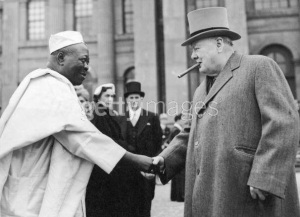Our history is distorted – too much uncomfortable inconsistencies in our past that make the so-called Cradle of Yoruba people less appealing. The inhume manners we treat one another have always been hidden from the public. We fabricate our stories with the hope that people remained delusional for generations to come.
Oba to je, t’ilu f’toro, oruko re ko ni pare – The king whose time on the throne brings harmony to the people will be remembered.
It was astonishing learning there once was a king at Ile Ife, well respected for his integrity both at home and on the world stage – this was Oba Adesoji Aderemi. I knew of Oba Aderemi story since I was little, his name would pop up once a while as a reminder to me and many other confused people around that relationships between Ife and Modakeke was once peaceful – no remorse from either parties.

The joy that came with this reminder was always short-lived as the reality on ground is far more painful.
What I found most interesting was that Sir Adesoji was occupied himself building Yorubaland and making his influence known within Nigeria while actively contributing to the struggle of our people at the time. He was the first African governor in the British Empire and Commonwealth. This says a lot about him as you do not get to that post when your hometown was on ‘fire.’ After his retirement from politics in 1962, he focussed mainly on his role as the king and spent his time leading his people and environment to a community where everyone feels valued as a person. This must be one of the reasons his reputation has never being clouded with controversies – everyone thinks he was a great leader.
Oba to je t’ilu fi t’uka oruko re k’oni pare – The king whose time on the throne encourages hatred and dispersion among his people will be remembered.
I read with interest Oba Okunade Sijuade’s coronation speech on December 06, 1980. The last paragraph of his amazing speech was the only part that touched on his sole mission as the king. “I declare that the era that ended in 1910 will resume in Ife. In that year, Olubuse I departed to join his ancestors. On 17th September 1980, he was being reincarnated to continue his reign and fulfill further aspects of his mission.” reads Olubuse 11.
Here the new king was talking about his father Olubuse 1, he was making promises to his people that he would start where his father left off in 1910 – before 1980, the last time Modakeke and Ife had crisis that wasted many lives and properties was the time of Oba Olubuse 1.
Culture must be adaptive, otherwise friction will continue.
Humans are still evolving, it is unrealistic to assume simply because Olubuse 1 managed to do all that he did to suppress his neighbours with no questions asked nor repercussions faced should mean that his son decades down the line must embark on the same mission. And the fact that Olubuse 11 has really tried his best from his first day on the throne in 1980 to complete the dreams from his father should not mean it is the right thing to do – maybe the acts of violence over dialogue was fashionable in the past, the world has changed now and it is changing daily.
There maybe upper hand today but that may not necessarily be the case for future generations – we all have the power to stop the oppression NOW and let Modakekes have their farms they’ve worked on for more than 300 years. The kids whose livelihood have been taken today will not remain kids for ever – they’d grow up, likely to be uneducated and no skills – they are the main threat to the over-privileged children you are hoarding all the wealth to.
Most of our histories are not written but that was in the past. Today we are all documenting as much as we can, and as honestly as we must – history may not be that hard to trace as it used to be for future generations
- You can’t separate peace from freedom because no one can be at peace unless he has his freedom. Malcolm X